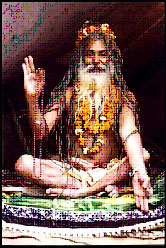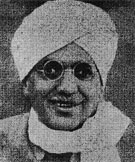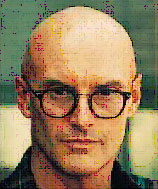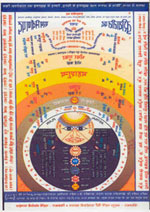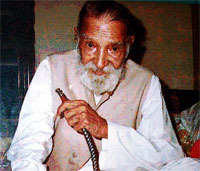|
TRANSLATE THIS ARTICLE
Integral World: Exploring Theories of Everything
An independent forum for a critical discussion of the integral philosophy of Ken Wilber
 David Christopher Lane David Christopher Lane, Ph.D.
Professor of Philosophy, Mt. San Antonio College Lecturer in Religious Studies, California State University, Long Beach Author of Exposing Cults: When the Skeptical Mind Confronts the Mystical (New York and London: Garland Publishers, 1994) and The Radhasoami Tradition: A Critical History of Guru Succession (New York and London: Garland Publishers, 1992). 
SEE MORE ESSAYS WRITTEN BY DAVID LANE
The Guru
has no Turban
Why Perfect Masters Don't Exist
David Lane
THESIS: It seems obvious that our gurus, prophets, and sages are much more human than we wish to believe. Yet, despite
all the indicative signposts which clearly demonstrate the frailties of our beloved religious figures, we persist in
inflating them to wholly unreasonable heights of glory.
The Guru has NO turban and all the images we project upon him or her are, at the end of the day, our own.
One of the more celebrated, if inappropriate, honorifics we have bestowed on our chosen gurus is the term "Perfect Master." It may be one thing to call a teacher a master (he or she may know more than us in a certain subject), but it is quite another to call such mastery "perfect." The first and most troublesome problem is one of definition: what do we actually mean by "perfect"? My sense is that we fundamentally misunderstand the honorific and we do not fully understand the implications involved when applying such terms to living human beings. My argument is a very simple one: The guru is not perfect, at least not in the ways that we may assume. But despite the fact that we can easily demonstrate the limitations and fallibilities of our gurus, we somehow hold on to the naive concept that a Guru can be an all-knowing and all-powerful being.
In writing this series I had two options: 1) to write a third person narrative and keep a somewhat detached voice, pointing out the inherent mistakes we make when saying the Guru is God; or 2) writing a first person narrative, more or less, in which I take my own spiritual tradition to task by citing certain empirical examples of how the guru is not all-knowing or all-powerful. I have opted for the latter course, knowing fully well that I am going to offend many people in the process, particularly my friends and maybe even myself. But let me say right at the outset that I am not anti-guru or anti shabd yoga. Rather, I am very fond of my own guru and my own path, but I have come to realize that there is way too much hyperbole and too much ideological work going on when it comes to "Perfect" Masters. In short, if I may invoke the vernacular, this subject of "Perfect" gurus is replete with B.S.--so much so that clear thinking on the subject has given way to cultic silliness.
I think we are much better served by critically accepting the humanness of our "Perfect" gurus than in intellectually torturing ourselves with spiritual gymnastics, such as: "No, my guru is not yawning because he is tired [God can't yawn], but because he is swallowing up the disciples' karmas [yep, this was told to me in India by an earnest devotee who didn't blink in the telling.] Let us start with the first order of silliness: The Master has a "Perfect" Body.
� THE BODY
1. Although a large number of devotees in shabd yoga traditions will accept the physical limitations of their respective gurus, there is still a significant contingency which will implicitly (and, at times, explicitly) argue that the guru does indeed have a "perfect" body (whatever that may mean). I still fondly recall meeting a young man who got really upset and left his spiritual path after finding out that his guru was bald. He told me that a true guru cannot go bald and when he saw his guru without his turban he was shocked.... No hair! When I tried to counter argue with him that the guru's body is just that ... a body like yours or mine, he didn't buy it. In fact, he went on: "Yea, not only is my guru bald, but he also wears glasses. How can God wear glasses?"
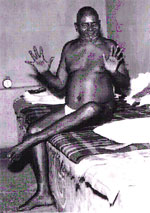
2. It so happens that many middle-aged gurus have a bulging waistline. They have what my father had: a growing pouch! But, unlike my father, who knew his increasing girth was due to late night binges of ice cream and candy bars, certain disciples feel that the guru is fat for a spiritual reason. You see, it is just not kosher to say, "Yea, my guru is getting fat; he likes to eat and doesn't get much exercise" (a pretty solid explanation). Rather, some argue that there must be a "higher" reason or meaning. These range from: "Oh, he awakened his kundalini and that is why his stomach is pot shaped; when the shaktipat arises, the stomach protrudes." "My guru is not fat! He is literally eating the disciples karmas in his own stomach." "The God-man is not fat. He is full of life in the solar plexus."

3. I have met a number of gurus (whose disciples claim that they are God in the flesh), who have been physically ill or sick. I remember meeting with Agam Prasad Mathur at his home in Peepal Mandi, Agra, India, and noticed that he was not feeling well. Now from my perspective it looked like Agam was suffering from a bad cold or flu. I felt sorry for him since his health was not up to par. Yet, his disciples didn't say "Yea, guru has a bad cold." Rather, there were all sorts of dramatic explanations revolving around karma. "You see, Dave, the Master is taking on the karmas of his disciples and he is literally paying off their debt in his own body. He is so compassionate. The Master himself, of course, never suffers. He is always enjoying the divine inner bliss." Well, that's a nice way of "explaining way" Agam's obvious suffering, but such metaphysical trapeze work seems to me a long-winded way of avoiding the obvious: The guru is sick! That's okay, most of us get sick from time to time, but we don't need to resort to non credible theories for why we are sick. Indeed, if the guru's body is simply the manifestation of "eating karma" then when he is healthy it is no different than when he was sick. Yet, it is precisely when he is sick that the disciple wheels out the elaborate explanation for why he is in such a state.
In the Sociology of Knowledge there is a nice phrase for this kind of posturing: "Ideological Work"--the attempt to reconcile a discrepancy between theory and praxis. That is, what do you when your theology demands a certain ideal and the actual example of it cannot and does not live up to it? One then is forced by the searing breach to engage in ideological work. The bigger the gap between the ideal and the example and the more mentalistic footwork that is demanded. For instance, if one is brought up in a spiritual tradition where the guru is seen as merely mortal there is not much difficulty when he or she gets a cold/flu. Hey, she's just sick. No need to elaborate. But in traditions where the guru is elevated to Almighty status there can be potential difficulties when the guru shows signs of physical weakness.
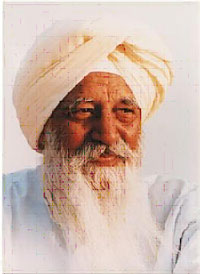
I remember noting that one esteemed guru in India seemed to get regularly ill after conducting mass initiations. The "unofficial" buzz around the ashram was that the guru was "taking" on the new initiates' karma. Naturally, I had a different hunch of the situation. I noticed that thousands of people would get really close to him during this time and, invariably, a few of them had colds or other contagious ailments. I thought to myself that this was the underlying cause for the guru's illness, since I even seem more prone to getting colds and the like after interacting with large groups of people (particularly when dealing with college students in conferences).
Then there are those "embarrassing" things that gurus do, like pick their nose. In India, especially in the Punjab, I have noticed a lot of gurus picking their nose (and I do mean "picking"!). Why? It's dusty. Now this is where I would expect some "karmic relief" theory to be brought out. "No, the guru is picking away at dirt of our soul and his nose is simply the symbol of it." However, I have yet to hear a karmic explanation for nose picking. Maybe it is too obvious or too personal or too funky. But I most certainly do hear karmic theories for colds, for yawning, for back troubles, etc. My sense is that some things are too bodily obvious to demand any ideological work. "No, the guru doesn't pee for himself. He is simply whizzing our sins down the toilet."
4. Let's talk about how gurus eat. I have a dear memory of my own guru eating a particularly sweet Indian delicacy known as a Jelebi. He seemed to genuinely relish it. I like jelebis myself, especially when they are fresh and hot, so I had no trouble "understanding" why he enjoyed the dessert . . . they are good!
But when I talked later about my guru's eating habits, one disciple chimed in and said, "No, the guru doesn't even taste food; he does not allow his consciousness to descend below Trikuti (the second inner region in the cosmology of neo-santism). Thus he is only aware of those things beyond the senses/mind." Yea (I mused to myself), sure, so that's why he is eating the sweetest thing on the menu, bro, and probably the least healthy as well.

I have a truly simple explanation for the guru's eating habits: he eats what he likes just as most of do. Kirpal Singh, founder of Ruhani Satsang, liked to drink Coca Cola and not just one or two. It actually made me think higher of Kirpal Singh. I thought it was cool that he drank Coke. But for some disciples (not Robert Leverant, the source of my story, who had no problem with it) Kirpal Singh's Coke drinking "needed" explaining. The God-man can't just drink Coca Cola for its own sake (especially since it appeared to contradict his missives on not drinking aerated liquid), but there has to be some deeper or higher purpose for it. I got a much simpler one: he was thirsty.

Ajaib Singh, one of Kirpal Singh's more celebrated successors, drank a Campa Cola right in front of me (Coca Cola had been banned by this time--1978--and one could only get it on the black market . . . Don't ask how "I" know). I could tell by watching him that he dug it and he drank it in one huge gulp. I didn't dare ask him "why" since I wanted one too. Then Ajaib Singh let out an apparently satisfying burp. Totally understandable. Any divine reasons? I got one: too much gas.
THE MIND
5. I have yet to meet a Perfect Master who has a "perfect" mind. As Ken Wilber once rightly stated (I am paraphrasing): "I have never seen a perfect guru run a sub 4 minute mile with his 'perfect' body or explain Einstein's theory of relativity with his 'perfect' mind." Faqir Chand point blank stated that he "didn't know" when his form appeared to disciples worldwide, whether in meditation, in times of distress, or even in dreams. Faqir argued that these projections were products of one's own mind (lower or higher, dream or astral, etc.) and that the guru herself does not consciously project in the mind of the neophyte. Indeed, the guru may not even have a clue that the disciple is thinking about him/her.
I recall getting a phone call from a Catholic woman in Oklahoma, I believe, who got my number from the editors of FATE magazine. Apparently, she had been praying/meditating one day and she had a vision of a guru with a long white beard and turban who informed her that she would learn more about him that day. Later she happened to pick up a copy of FATE magazine which contained an article I wrote entitled “The Enchanted Land: A Journey with the Saints of India” which described my visits with various shabd yoga gurus in India. When she saw the picture of Charan Singh that accompanied the article she was thrilled, since--as she alleges--it was this same Charan Singh who had appeared to her during her prayer/meditation. She was so enthralled in fact that she tracked me down and asked for more information. Being somewhat skeptical by nature of transpersonal or paranormal happenings (even when connected with my path), I advised her to write a letter to Charan Singh about it and ask his opinion. She did and a few weeks later he wrote her a long reply in which he stated that the vision was, more or less, a projection of her own mind and that he had nothing to do with it.
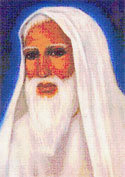
I realize that Parapsychological and Occult literature is replete with "knowing" bilocations, but my hunch is that even if we accept some of these as authentic (and that is, of course, a huge leap; better to closely examine the conditions and the context surrounding the transmundane happening), the vast majority of inner visions and the like are indubitably linked with our own (and not some exterior) consciousness. I don't think the Virgin Mary is on hold right now waiting to be called so that she can make an appearance on a flour tortilla somewhere; moreover, I don't think Elvis is hanging out at the end of the tunnel to greet his followers.
What you see is what you bring to the neurological/mystical (you choose) picnic. The Galaxy of Cosmic characters, I would imagine, are not baking pie waiting for some glub from Duarte to have a car accident just so they can make a "Divine" appearance. In my thirty plus years in this field I have seen nothing of the kind. I have seen, of course, some really impressive people and some really beautiful acts of kindness (free food, free hospitals, free eye camps, etc.), but I have yet to see an airtight case for "all knowingness." I have seen too many examples of unknowingness and no facade of "humility" can fully cover it up. And that is not to fault the guru in question (since in some cases he or she was chosen for the role against his/her will or desire; just read Treasure Beyond Measure for an illustration of this), but the theological constraints which do not allow for letting the guru be just as he is: a human being. It is their "humanity" manifested in good acts or kind gestures or selfless service which is truly impressive, not the unproven idea that they are All-Powerful and All-Knowing. If such gurus are, in fact, All-Knowing they do a lousy job of showing it.
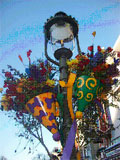
How else can we explain the following:
- An esteemed Master mistaking Disneyland's fake flowers for real ones (this interesting moment is captured on film).
- A Master addressing a woman as sir, only to be corrected by the woman in public.
- A Master instructing a woman in a letter to talk with her college teacher before writing him in the first place. (The glitch here is that the woman did talk with me first and I told her to write to him!)
- A Master forgetting that the person he is talking with had already been initiated by him (He queried, "How do you know the five names if you have not been initiated?" His reply, "But I was!")
- A Master incorrectly stating facts and dates of history, only to be corrected by a member of the audience.
- A Master writing about a genealogical connection between gurus and stating it as fact only to have future scholars prove that the assertion is historically impossible.
I could go on, and these are merely minor incidents to be sure, but the list of examples is huge.
Of course, all of this is "normal" if we accept the idea that the guru is human. But it becomes downright strange if we think the Guru is All-Knowing because then we are stuck with lots of explaining to do (Ideological Work 101), the very thing we shouldn't have to do if the Guru demonstrated his/her all-knowingness. And the claim that the guru is merely being humble just doesn't pass the litmus test, because more often than not that simple humility can be re-translated as outright lying. I have talked with lots of shabd yoga gurus in my time and though a few are genuinely brilliant, it does so happen that even their verbal responses are error prone. Again, completely normal if we accept them as humans; completely abnormal if we think they are God.
PROPERTY

I just don't get it. If the Perfect Master is one with Anami Purush (the Transcendental Lord), then why does he give a crap about some junky property in Agra, India? You see, there has been a decades long legal battle (and occasional fist-fight) between two Radhasoami groups (now known as Soami Bagh and Dayal Bagh) in Agra, India, over worship rights at Shiv Dayal Singh's samadh. They have gone to Indian courts over this matter for some fifty plus years; it makes the length of the O.J. trials seem like a weekend in comparison. And what are these "lineages of Perfect Masters" fighting over? Real estate That's right, who owns what and who has the rights to utilize such. Hey, I have been to Soami Bagh and Dayal Bagh and let me tell you: it's not La Jolla, California. It's not even El Cajon. It's dirt and lots of it. Okay, there is this half-built samadh that is a wanna-be Taj Mahal that is probably never going to get finished but who cares? Geez, if you have access to "all" the real states (pun intended) of every known and unknown multiverse, I think it just might be possible to practice a little "detachment" and let go of the spiritual parking lot, huh? The fact that these "Perfect" Masters are not letting go of the lawsuits or the real (I am tempted to say "illusory") estate speaks volumes to me personally. It sounds awful human to me and no matter how you slice it, the Soami Bagh/Dayal Bagh duel is human greed at its worst, except that its disguised under "spiritual" worship rights. Typical human stupidity cannot be acknowledged for what it is in these turf wars. Instead it has to be dressed up in theological garb as if the ultimate state of the cosmos really depended upon some shitty piece of property in Uttar Pradesh.
You know it is time for a Sant Mat group to call it quits when it has to spend much of its time suing others over property rights. I would be impressed if just one of these groups would say, "Hey, you take the fudging land; we'll meditate instead." Hasn't happened, though; I guess those "inner" lights just don't compare with that water view over the polluted Jumna.
If Sant Mat is a structural science (an inherent higher potential within every human being, regardless of caste/creed/race/cola affiliation), as the various "Perfect" Masters proclaim, and not merely a cultural club to win property and influence friends, then they should start acting like it. Lighten up about the world-wide build up of property. Lighten up about trying to "trademark" shabd yoga terms (yes, even certain groups in India are following the capitalistic model). Lighten up about trying to "control" the free flow of information (just try reading the history of shabd yoga from one of the respective lineages. Tell me how much you "learn" about the other groups. Not much, I can assure you.). Lighten up because according to your own philosophy, the ultimate goal is not this place, but it radical transcendence. If transcendence is the case, then it is a bit mind boggling to see how much concern there is in "trademarks," "property rights," "money seva," and "litigation over willed estates." To be sure, I understand why organizations indulge in such actions, but I don't think it exemplifies the "universal" teachings by trying to mimic XEROX or IBM or MICROSOFT. If my metaphorical friend Kabir was to reincarnate again (literalists beware, I am indulging in a parable) and he saw what has happened, I get a sneaky suspicion that he would be the first to throw rocks at the ashram's wall, perhaps shouting cryptically: "What does real estate got to do with going within? What do trademarks got to do with perennial truths? Why are Perfect Masters suing each other and their disciples in courts?" He may just say, "Hey, shut up and meditate."
POSTSCRIPT
Faqir Chand once commented to me that most of the "Perfect" Masters that he knew died in very "imperfect" ways. Faqir, to his credit, was merely stating the obvious and, unlike many of his counterparts, he saw no reason to lamely justify a dying guru's illness under the pretext that he/she was doing a "karmic readjustment." Sawan Singh died of cancer; Kirpal Singh had prostate surgery; Charan Singh had heart problems; Jagat Singh was ill for much his tenure. People die; "Perfect" masters die. That "cancer" or "heart problems" or "prostate difficulties" is due to carrying the disciples' load of karma seems to me an unnecessary way to rationalize the humanness of how all gurus have died.
Faqir Chand didn't "know" exactly when he was going to die, nor do I suspect that most gurus. If Faqir Chand "knew" then he certainly did a good job of hiding it from me. I talked with him on the phone just a few weeks before he died. He called me at my mom's house late one evening and we had a delightful conversation and I even made it a point to ask him about his health: he said that despite being older and weaker he was otherwise doing fine. Just a couple of days later though he had a cardiac arrest and went into a coma. It is true that Faqir gave some signs that he was going to die (ranging from the often told story of how Faqir informed his friend in Delhi that he was going to come back in a black box from the USA to his lucid awareness just moments before expiring), but I don't think he knew "exactly" and "precisely" when he was going to die. Do we?
Okay, I am sure there are some who have a better idea of when they are going to transpire than others (for instance, my own brother had a pretty good hunch and told me so), but I don't think the track record of "Perfect" Masters is that much better than plain ordinary folk. The primary difference, I have noticed, is that disciples just won't allow for "unknowingness" when it comes to their respective gurus dying. Rarely do I hear the following: "Yea, my guru died completely unexpectedly--we didn't have a clue and neither did he!" Instead we get lots of hagiography, the almost immediate embellishment of stories of how the guru "really" did know but just gave hints. Darshan Singh was a genuinely nice person and almost everybody I know who knew him liked him. But when he died in May of 1989 it came as a big surprise to even his close associates. Indeed, he had even planned for a summer tour in the USA and thousands of dollars were spent promoting his tour (with his picture, by the way). Now I am confident that disciples of Darshan Singh would argue that their Master really had planned his exit all along. But that's not what it looks like from the outside.
Thus, what do we really have here? Unknowing gurus posing as "knowing" masters and caught in the crossfire are naive and unsuspecting seekers (of all ages and from all sorts of backgrounds) believing that these very human beings are Divinely connected. Unplug the projections and untie the turban. The guru is human, the guru is human. That mantra is the rational chant of those who have realized that Toto is the great revealer of the puffery and showmanship of the Wizard of Oz. And what did Toto reveal? That the "Great" Wizard was a small man hiding behind a curtain. Or, more precisely to fit in with our analogy, the Guru has NO turban and all the images we project upon him or her are, at the end of the day, our own. The real guru, if there is such a beast, will perform dastarbandi (the turban tying ceremony) on YOU and not on himself.
The guru should be shaking underneath his turban if he is not what he claims to be. Perfection is precisely that—perfect--and any guru who uses such descriptions is worthy of our deep skepticism.
|
 David Christopher Lane, Ph.D.
Professor of Philosophy, Mt. San Antonio College Lecturer in Religious Studies, California State University, Long Beach Author of Exposing Cults: When the Skeptical Mind Confronts the Mystical (New York and London: Garland Publishers, 1994) and The Radhasoami Tradition: A Critical History of Guru Succession (New York and London: Garland Publishers, 1992).
David Christopher Lane, Ph.D.
Professor of Philosophy, Mt. San Antonio College Lecturer in Religious Studies, California State University, Long Beach Author of Exposing Cults: When the Skeptical Mind Confronts the Mystical (New York and London: Garland Publishers, 1994) and The Radhasoami Tradition: A Critical History of Guru Succession (New York and London: Garland Publishers, 1992).
